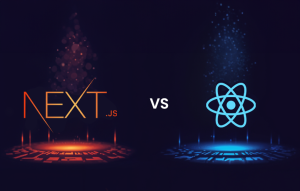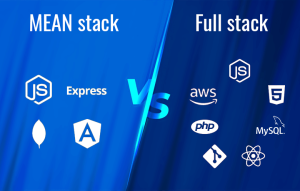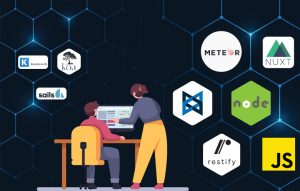Are you looking to hire the best full stack developer? If so, you are not alone. In today’s digital world, demand for skilled developers is at an all-time high. If you are looking for full stack development services, you have a lot of options available. But with so many options available, how do you know which one to choose? Making the wrong choice can be costly and time-consuming, leading to frustration and lost revenue.
The U.S. Bureau of Labor Statistics, as of February 2023, predicts a 25% increase in software developer jobs between 2021 and 2031, faster than the average for all occupations. The average growth rate for all occupations is 5%. This results in a ratio of only 56 qualified developers for every 100 job openings. Finding the right candidate can be challenging, but one must recognize the shortage of skilled professionals.
If you are looking to hire a full stack developer, it’s essential to choose a company that offers comprehensive full stack development services. Hiring the right full stack developer can significantly impact your company’s ROI.
That’s why we have compiled the top five things to consider before hiring a full stack developer. Whether you are a startup or a well-established business, these considerations are essential to hiring the right person in an hour. So, without further ado, let’s dive into these essential points.
- The importance of assessing technical skills
- Evaluating problem-solving and analytical abilities
- Communication and collaboration skills matter
- Versatility in technology and languages
- Continuous learning and keeping up with trends
Before you hire a full stack developer, consider these five essential factors. These sections will provide you with a detailed overview of 25 actionable tips. With our tips, you will be able to find the right fit for your project or team. So, let’s begin!
Suggested: How adopting full stack development trends in 2023 can give you a competitive edge?
Technical skills
Technical skills are essential for any developer. They are especially crucial for full stack developers, as they are expected to work on both the front-end and back-end of a project. Without the right technical skills, a developer may struggle to complete tasks and create high-quality products.
However, assessing technical skills can be a challenge. Traditional interview questions may not always be effective at gauging a candidate’s abilities. Further, resumes and portfolios may not always accurately reflect a developer’s true skills. Finding ways to evaluate a candidate’s technical skills is essential.
Here are some actionable tips to help you assess a candidate’s technical skills:
- Give candidates a technical challenge to solve, such as a coding project, a bug fix, or a task related to a particular technology or language.
- Ask follow-up questions to understand how the developer approached the task and solved the problems.
- Request code samples or a portfolio of their previous work to evaluate their skills.
- Use online coding assessments or technical skills tests to gauge their proficiency.
- Conduct a pair programming session with the candidate to evaluate their coding abilities, problem-solving skills and collaboration with others in real time.
Along with the tips mentioned above, use the following checklist to assess a candidate’s technical skills. This will ensure they fit into your project or team.
1. The candidate has a solid foundation in programming languages such as Java, Python, or JavaScript.
2. The candidate has experience in both front-end and back-end development.
3. The candidate can develop applications with frameworks such as React, Angular, or Vue.
4. The candidate can work with databases such as MySQL, PostgreSQL, or MongoDB.
5. The candidate can build and deploy applications using cloud services such as AWS or Azure.
6. The candidate has experience with version control tools like Git or SVN.
7. The candidate is up-to-date with the latest industry trends and technologies.
8. The candidate has a strong portfolio showcasing their technical skills and past projects.
Critical thinking
Full-stack development involves working on complex systems and solving problems that require critical-thinking. Therefore, assessing a candidate’s problem-solving and analytical abilities is essential before hiring them for your project. Hiring a developer who cannot think outside the box or lacks analytical skills can lead to delayed projects, inefficient processes and poor results.
Assessing critical thinking skills is crucial for technical roles but challenging. Traditional interviews may not suffice. A thorough evaluation is essential to determining a candidate’s problem-solving abilities and approach to complex problems.
To help you assess a candidate’s problem-solving and analytical abilities, here are some actionable tips:
- Ask candidates to solve real-world problems or provide them with hypothetical scenarios and ask how they would solve them.
- Observe their problem-solving process. This includes how they approach the problem, break it down and propose solutions.
- Ask candidates to explain their thought process and reasoning behind their solutions.
- Ask candidates to provide examples of complex problems they solved in their previous roles and how they approached them.
- Check their problem-solving and analytical abilities through technical tests, such as coding challenges, whiteboard sessions, or case studies.
Use the below checklist to assess a candidate’s problem-solving and analytical abilities:
1. The candidate can break down complex problems into smaller components.
2. The candidate can propose multiple solutions to a problem.
3. The candidate can explain their thought process and reasoning behind their solutions.
4. The candidate can provide examples of complex problems they have solved in previous roles.
5. The candidate performed well in technical tests.
By evaluating a candidate’s problem-solving and analytical abilities, you can ensure you hire someone who can think critically and provide effective solutions to complex problems.
Suggested: The only full stack development guide you’ll ever need – get it now!
Interpersonal skills
Effective interpersonal skills are critical for any developer. They must interact effectively with various stakeholders, including clients, team members, project managers and developers. Strong interpersonal skills can ensure everyone is on the same page, prevent misunderstandings, improve collaboration and work towards a common goal.
Assessing interpersonal skills is challenging because it’s not a technical skill that can be measured by coding or testing. Candidates often present themselves as excellent communicators or collaborators during interviews. However, their real skills may not align with their presentation.
Here are some actionable tips for assessing a candidate’s interpersonal skills:
- Ask candidates to explain technical concepts or problems in simple terms which are easy to understand for non-technical stakeholders.
- Observe how candidates communicate during the interview, including their tone, body language and listening skills.
- Ask candidates to provide examples of communicating effectively with team members, clients, or other stakeholders in previous roles.
- Ask for references or contact previous employers to understand how candidates communicate with others in a work environment.
- Give candidates a task and observe how they communicate with team members, ask for feedback, and incorporate suggestions.
Want a checklist to assess a candidate’s interpersonal skills?
Give us your name and business email below to get the checklist today:
By assessing a candidate’s interpersonal skills, you can ensure they are an excellent fit for your team and can collaborate effectively with others.
Adaptability
Adaptability is crucial when hiring a full-stack developer because the tech landscape constantly changes. Your developer must adapt to new technologies and programming languages as they emerge. You don’t want to hire someone who is only proficient in one or two technologies and can’t work with anything else. An adaptable developer can take on new challenges and learn new technologies quickly, which is vital for your project’s success.
The challenges in assessing adaptability can include not knowing what skills will be necessary in the future. Another challenge is determining if the developer has a genuine willingness to learn and adapt. Also, it can be difficult to determine if the developer has the intellectual capacity to learn new skills.
Here are some actionable tips for assessing a candidate’s adaptability:
- Look into the developer’s previous projects, experience and education to determine if they have past experience adapting to new technologies.
- Ask questions about their learning process of new technologies and programming languages.
- Give developers a coding test that includes tasks related to technologies they may not have worked with before to gauge their ability to learn and adapt.
- Ask the developer about their passion for learning and how they keep up with the latest trends in the tech industry.
- Contact the developer’s references and ask them about the developer’s ability to adapt to new technologies and their overall adaptability.
Want a checklist to assess a candidate’s interpersonal skills?
Give us your name and business email below to get the checklist today:
Suggested: Revolutionize your full stack development with these 3 game-changing solutions
Continuous learning
New technologies, programming languages and frameworks are introduced regularly. Developers must keep up with the latest trends to stay relevant. Therefore, hiring a full-stack developer with a passion for continuous learning can be an asset to your project.
Assessing continuous learning can be challenging, as experienced candidates may need more interest, while enthusiastic candidates may need more experience.
Here are some actionable tips to help you assess a candidate’s ability to keep up with continuous learning:
- Ask about their passion for learning and involvement in tech communities, hackathons, or conferences.
- Review their education and training to determine their history of taking courses or attending workshops.
- Check their online presence, such as their blog or GitHub profile, to see if they actively learn and contribute to the community.
- Ask about their experience with new technologies and how they approach learning new things.
- Check their attitude towards failure and how they handle setbacks.
Want a checklist to assess a candidate’s interpersonal skills?
Give us your name and business email below to get the checklist today:
Conclusion
In conclusion, hiring a full-stack developer is a critical decision. However, with these 25 actionable tips, you can take care of several essential factors to hire the most qualified full stack developer. Technical skills, problem-solving abilities, adaptability, communication skills and continuous learning are all crucial attributes of a full-stack developer.
Employers should assess these skills and qualities through various actionable tips. This includes asking for real-world problem-solving examples, reviewing education and training, and checking their online presence. By using these tips, employers can make an informed decision when hiring a full-stack developer who can meet their business needs and contribute to the growth and success of their organization.








